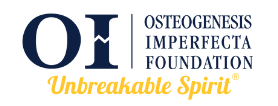Share
OIF Receives New Funding from the Patient Centered Outcomes Research Institute

Rare Bone Diseases account for 5% of all birth defects and virtually all rare bone diseases cause significant physical disabilities. Patients and caregivers are frequently isolated and uncertain about best care practices. Using virtual technology allows patients and clinicians to connect and to gain knowledge of their particular rare bone disorder.
The project Leveraging Virtual Communication to Advance PCOR Adoption by the Rare Bone Disease Community will work to leverage the relationships among members of the Rare Bone Disease Alliance to host virtual meetings with leaders and stakeholders as well as clinician/researchers who often care for a number of rare diseases. The Rare Bone Disease Alliance is a network of patient groups and professionals dedicated to improving the lives of people with various rare bone diseases.
The aim of the project is to share the successful PCOR experience of the Osteogenesis Imperfecta Foundation with the rare bone disease community. The project will pay particular attention to reaching stakeholders from underrepresented communities.
To achieve this goal, the project will convene a series of virtual meetings over one year that enhances collaboration among rare bone disease communities; increases underrepresented community participation in PCORI; engages with stakeholders who may be disadvantaged by the digital divide; initiates an engagement approach that fosters collaboration and partnerships; and develops a road map to implement and sustain robust stakeholder engagement built solely on virtual platforms. The project will convene a series of 3 large group virtual meetings that will introduce PCOR to the rare bone disease communities. In addition, the project will hold several focus group virtual meetings with patients and caregivers to ascertain the barriers to expert care from the patient perspective while identifying potential collaborative clinical research opportunities.
The 13 Rare Bone Disease Alliance patient organizations are invited to make up the project’s Advisory Committee along with other stakeholders, including rare bone expert clinicians.
The Osteogenesis Imperfecta Foundation serves as the lead patient organization supported by OI expert and orthopedic surgeon Dr. Laura Tosi and Duke University’s Dr. Bryce Reeve, from its Populations Sciences Department, as subcontractors.
